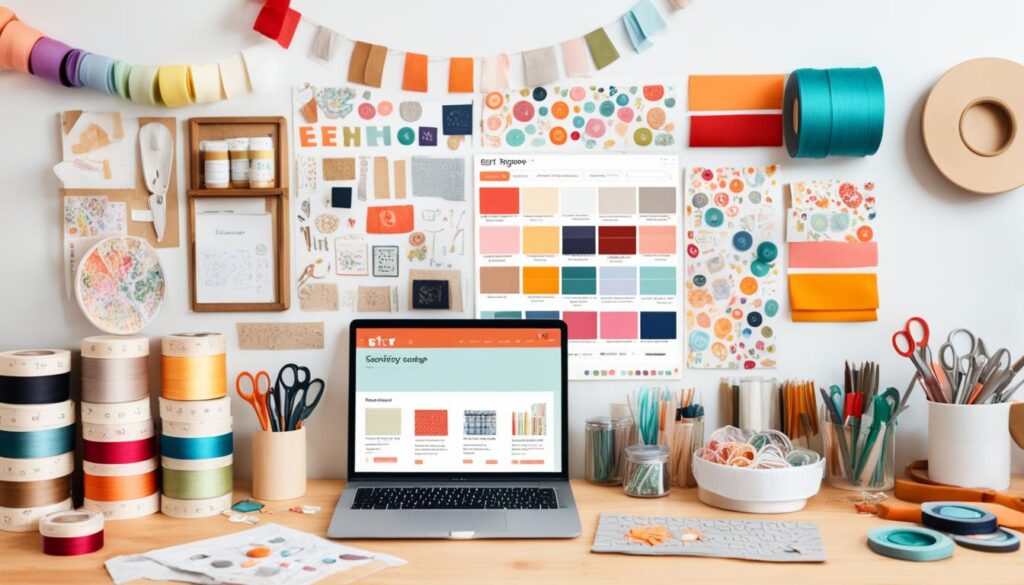Did you know the global DIY market is set to hit $1.1 trillion by 2027? This boom offers a great chance for you to turn your creative hobbies into a profitable small business. Hey, I am Sanu and this article will help you to start a small DIY business which will be profitable.
This guide will show you how to start and grow your own DIY business from home. If you love crafting, woodworking, or any DIY project, you’ll learn how to make your skills pay off. You’ll get the knowledge and tools to turn your passion into a successful business. In 2024 this will be good niche but if you are a beginner then this will be not easy but when you work passionately then it will be possible.

We’ll cover finding your unique DIY niche, making a solid business plan, and setting up an online presence. You’ll also learn how to market your handmade products. This article will give you the tools and strategies to make your entrepreneurial dreams come true. So, let’s start your journey to a DIY business you can be proud of.
Identifying Your DIY Passion
Starting a small DIY business starts with finding what you love. Look into different crafts and niches that match your interests and skills. Think about what people want, how many others are doing it, and if you can make diy crafts to sell that stand out.
Exploring Craft Ideas and Niches
Try out various DIY projects to see what sparks your creativity and happiness. Look into the handmade product marketing world to see if your craft idea has a chance. Check how many others are doing it and if you can make something special.
- Identify your strengths and natural talents
- Explore a range of DIY categories, from jewelry making to woodworking
- Assess the market demand for your potential product ideas
- Determine if you can create unique, high-quality items at a competitive price
- Determine if you can create unique, high-quality items at a competitive price
Assessing Your Skills and Experience
Look at what you’re good at and what you’ve done before. This will show you what DIY activities you excel in and enjoy. It helps you find your unique selling point and the best diy crafts to sell niche.
| Skill | Experience Level | Passion Level |
|---|---|---|
| Jewelry Making | Intermediate | High |
| Woodworking | Beginner | Medium |
| Pottery | Advanced | High |
Think about your passions, skills, and what the market wants. This will help you find the ideal DIY niche for your small business.
“The key to success in any DIY business is to find the perfect intersection of your passions, skills, and market demand.”
How to Start a Small DIY Business
Starting a DIY business at home needs careful planning and action. First, pick your DIY passion and niche. Then, turn your creative ideas into a successful small business. We’ll help you with choosing the right business structure, getting licenses and permits, and finding financing options.
Selecting a Business Structure
Choosing the right legal structure for your DIY small business is key. You might be a sole proprietor, partner, or an LLC. Each has its pros and cons. Make sure to pick the one that fits your goals and how much risk you can take.
Securing Licenses and Permits
You might need licenses and permits for your DIY business, based on what you do and where you are. This could be a business license, sales tax permit, or special certifications. Know the local and state rules to follow them and avoid legal trouble.
Exploring Small Business Financing Options
Starting a DIY business at home often means you need money. Luckily, there are many small business financing options like loans, crowdfunding, and personal savings. Look for the best one for your home-based business ideas and your money situation.
| Financing Option | Pros | Cons |
|---|---|---|
| Small Business Loan | Provides a lot of money, can have lower interest rates | Needs good credit and collateral, takes a long time to apply |
| Crowdfunding | Reaches many potential investors, helps build your brand | It’s very competitive, success isn’t sure, and there are platform fees |
| Personal Savings | You keep full control and own everything, no debt | You can’t borrow much money, might use up your personal saving |
Think about your business structure, get the right licenses and permits, and look at small business financing options. This will help you start your DIY passion as a successful home business.
Creating a Business Plan
Creating a detailed business plan is key for your DIY business’s success. It acts as a guide, covering important topics like your target market, money plans, and how you’ll run your business.
Defining Your Target Market
Start by defining who your customers are. Think about their age, gender, money, where they live, and what they like. This info helps you make products they’ll love, set the right prices, and market effectively.
Setting Realistic Goals and Objectives
Once you know your market, set goals for your business. These could be about selling more, making more money, or growing your products or online presence. Having clear goals helps you see how you’re doing and make smart choices as you grow.
A good business plan also covers legal stuff like licenses, insurance, and taxes. Getting these things right early helps make sure your etsy shop setup and business follow the law and can keep going.
“A good business plan is your roadmap to success. It helps you navigate the challenges and opportunities ahead.”
Building an Online Presence
In today’s digital world, having a strong online presence is key for your DIY business’s success. You can set up an Etsy shop or your own website. This guide will help you create an online space that draws in customers and shows off your handmade items.
Setting Up an Etsy Shop or Website
Etsy is great for artists, crafters, and small businesses to sell their unique, handmade goods. It’s easy to use, has marketing tools, and lots of customers. It’s a good choice for starting your etsy shop setup. Or, you could make your own website for more control over your brand and customer experience.
Choose your path, but remember to make your online space stand out. Think about:
- Cohesive branding and visual identity
- High-quality product photography
- Detailed product descriptions and pricing
- Intuitive navigation and user-friendly layout
- Efficient inventory management and order fulfillment
Your online presence is often the first thing customers see. Make sure it makes a strong, lasting impression.

“The key to success in the digital age is to create an online presence that truly reflects the passion and craftsmanship of your DIY products.”
By setting up your Etsy shop or website thoughtfully, you’ll attract more customers and grow your diy workshop organization business.
Marketing Your DIY Products
Being an entrepreneur in the handmade product industry means you need to market well to succeed. Whether you’re selling diy crafts to sell or other handmade product marketing efforts, the right strategies are key. They help you reach and connect with your audience.
Utilizing Social Media Platforms
Social media is a powerful tool for small businesses. It lets you show off your products, build your brand, and meet potential customers. Instagram, Facebook, and Pinterest are great for showing off your handmade items. Share high-quality images, talk to your followers, and use hashtags to attract customers and boost sales of your diy crafts to sell.
Attending Local Craft Fairs and Markets
Local craft fairs and markets are great for showing off your handmade product marketing work. They let you meet customers face-to-face, get feedback, and make sales. Make sure your display is eye-catching, you have demos, and you’re friendly to visitors.
| Social Media Platform | Key Benefits for DIY Businesses |
|---|---|
| Highly visual platform for showcasing product photos and videos | |
| Versatile platform for sharing content, engaging with followers, and running targeted ads | |
| Ideal for sharing inspirational DIY project ideas and driving traffic to your online store |
“Marketing is not about the stuff that you make, but about the stories you tell.” – Seth Godin
Good handmade product marketing uses both online and in-person tactics. Use social media and local events to build your brand, connect with people, and increase sales of your diy crafts to sell.
Managing Finances and Legal Requirements
As a small DIY business owner, managing your finances and legal stuff is key to success. This guide will help you with budgeting, bookkeeping, and legal stuff you need to know.
Budgeting and Bookkeeping Essentials
Having a strong financial base is vital for small businesses. First, make a detailed budget for your costs and sales. Use accounting software or spreadsheets for keeping track of money in and out. This keeps you informed and follows the law.
Navigating DIY Business Legal Requirements
It’s important to know and follow the law for your DIY business. This means registering your business, getting the right licenses, and understanding taxes. Talk to a business lawyer or accountant to make sure you’re doing everything right and safe.
Handling your finances and legal stuff might seem hard, but it’s worth it. It sets a strong base for your DIY business to grow.

“Proper financial management and legal compliance are the cornerstones of a successful small DIY business.”
Sourcing Supplies and Organizing Your Workshop
Starting a DIY business means you need a well-organized workshop and reliable suppliers. We’ll look at how to find good suppliers and make your workspace better for work.
Finding Reliable Suppliers
Finding the right suppliers can seem hard, but it’s doable with some effort. Begin by visiting local craft stores, online shops, and industry groups. This helps you find suppliers who offer good materials at fair prices.
Make sure to compare prices, read reviews, and talk clearly with suppliers. This makes buying easy and trustworthy.
Optimizing Your Workspace
Organizing your workshop is key to doing well. Use strong shelves, bins, and labels to keep things tidy and within reach. A good inventory system helps you avoid running out of important items.
Also, arrange your workspace to reduce mess and work better. This lets you focus more on making things.
By picking the right suppliers and organizing your space, you’re on your way to a successful DIY business. Paying attention to details and always improving will keep you ahead. This way, you can make high-quality products for your customers.
Conclusion
Starting a small DIY business from home can be very rewarding. This guide has shown you how to turn your creative passion into a business. Stay focused, adaptable, and dedicated to making high-quality products for your customers.
With the right mindset and strategies, you can reach your business goals. You’ve learned how to find your niche, make a business plan, and market your products online. This guide has given you the tools and insights to start your DIY business journey.
As you start this new venture, keep giving great customer service and improve your craft. Always stay updated with the latest trends in your industry. This way, you’ll be ready to succeed in the DIY entrepreneurship world and make your creative passion a successful business.
FAQ
What are the key steps to starting a small DIY business?
Starting a small DIY business involves several steps. First, find your passion and niche. Then, make a detailed business plan.
Next, set up an online shop or website. Market your products well. Manage the money and legal sides of your business. Finally, find good suppliers and organize your workspace.
How do I determine the right DIY niche for my small business?
Start by looking at different crafts that match your interests and skills. Think about what people want, how many others are doing it, and if you can make something special.
Look at what you’re good at and what you love doing. Pick the DIY activities you’re best at and enjoy the most.
What are some important legal and financial considerations for starting a small DIY business?
Important legal and financial steps include picking the right business type and getting the needed licenses. You should also understand taxes, set up good bookkeeping, and look into financing options.
How can I build an effective online presence for my small DIY business?
Create an Etsy shop or your own website to sell your crafts. Focus on branding and making your products look great in photos. Manage your inventory well and make sure people can find you online.
What are some effective marketing strategies for a small DIY business?
Good marketing includes using social media to connect with customers and selling at local craft events. Building a strong brand and making your products look appealing online helps too.
How can I optimize my workshop or studio for my small DIY business?
Improve your workspace by finding reliable suppliers and organizing your area well. Use storage solutions and streamline your work. Make your space comfortable and inspiring for your DIY projects.